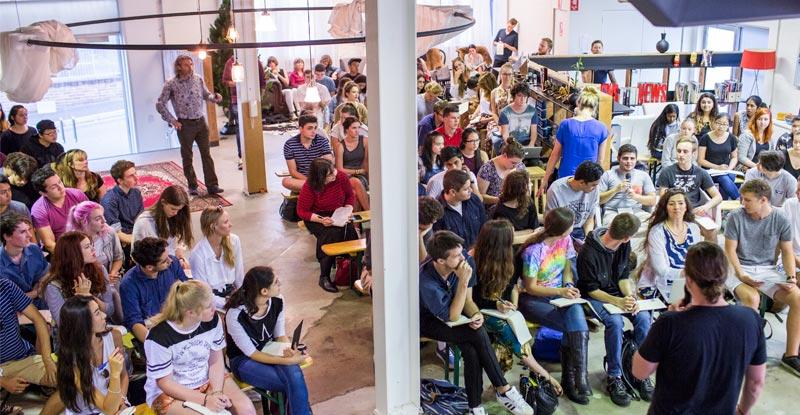
Keywords: social media, role play, first year, authentic assessment, creativity.
Faculty: Arts and Social Sciences
Number of students enrolled (Autumn session): 970
This is a first year subject in undergraduate Communication degrees. Teaching and learning strategies include a variety of large and small groups such as panels, discussions, pre-learning videos, in-class simulations and role plays, case studies and group work. Invited guest speakers are well-known public figures for university students from a diverse range of industries.
Why do we think it's successful?
Excitement and novelty
The lecturers stress the importance of building excitement for classes, as they believe the current generation of students expects a deeper level of engagement. Novelty and surprise are also perceived as being important and close attention is given to including variety in teaching and learning design.
The benefit of this strategy is that students never know what to expect when they come to class. For the lecturers, it is particularly important to engage students in classroom activities by adding a fun element - for example, declaring that everyone wearing stripes will participate in a debate, or that all the people sitting in the last row will contribute to a particular discussion.
Digital and social media
Each of the 37 tutorial groups has an individual Facebook group for students to interact with their tutors and classmates outside of class. Further use of social media included Twitter usage during classes, with the hashtag #citicom set up to allow students to tweet their questions to guest speakers. This did not replace traditional classroom practices, such as raising a hand to ask questions, but provided an additional means for students to engage with the material.
Guest speakers: combining real world experiences with theoretical discussions
The theoretical components of the subject were integrated with the real life experiences of guest speakers. These guests came from a variety of fields and backgrounds and were chosen for their appeal to the students. Speakers such as Australian musician Urthboy, the President of Amnesty International Australia, and a representative from grassroots climate conservation movement 350.org were all extremely popular amongst the students, who showed their appreciation and enthusiasm via tweets (“omg you would not guess who is in my lecture”).
Active learning strategies and encouraging participation
When leading a discussion about how citizens align political values with different political parties in Australia, 30 students were invited to the front of the classroom. They were then divided into three groups, representing different parties. Each of the students held a 'value', and a representative of the student body was assigned the task of moving those values around, so that the classroom would work towards having ten values in order – from most important to least important – according to each party: Liberal, Labor and Greens. In particular, the lecturers made a conscious choice about including The Greens as one of the parties, in acknowledgement that many university students express support for them. Encouraging participation from all students was a consistent theme for the learning design of the subject. Students were frequently required to engage with their peers sitting nearby in class discussions, before voting together on discussion points.
Time in preparing resources
The multi-faceted approach the lecturers took in preparing the class required a significant amount of time and effort, particularly because this was the first time this subject was taught in a more collaborative and creative format. Essentially, the subject was redesigned, which translated into approximately 15-20 hours for teaching staff spent on the subject every week - including teaching hours, maintaining social media resources and creating content. This amount of time may be shortened when the subject is taught in future sessions, as much of the material created for this class can be re-used.
It was crucial to involve tutors for the subject in class preparation, particularly in ensuring that their required material for teaching was completed and distributed in advance of the tutorials. The tutor manual was completed three weeks before the beginning of session so that tutors had time to understand and familiarise themselves with the overall subject. This amount of preparation and effort proved to be a positive investment, as tutors were also very engaged with the subject.
Authentic assessment
Students are asked to interpret social ideologies with creative methods through building a board game. This is a group task that begins in week 4 and continues throughout the session. The strategy behind this task is to encourage students to interact and engage collaboratively while reflecting personally on the ways that social institutions shape our understanding of the world. They communicate these ideas through the development of the board game, bringing a practical approach to demonstrate their theoretical understanding.
Photo credit: Jenna Price

